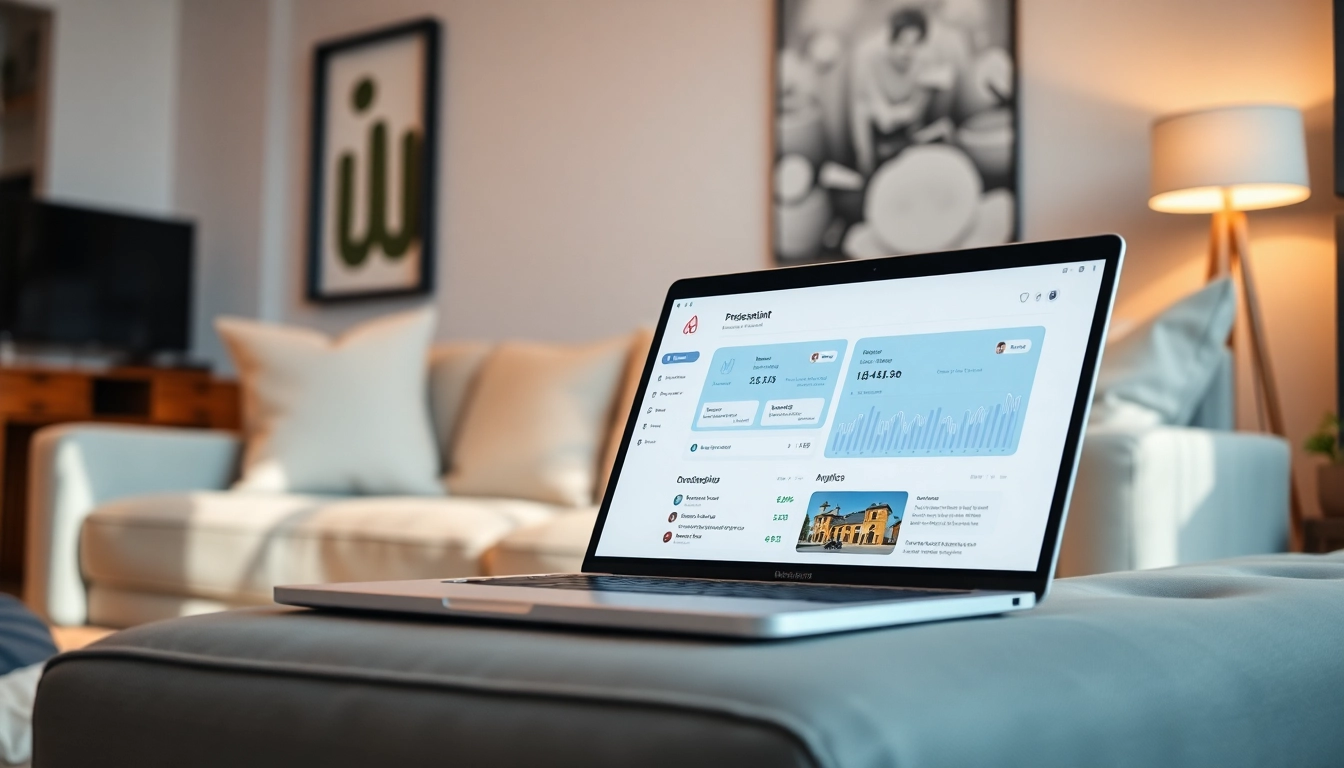Understanding the Airbnb Smart Assistant
What is an Airbnb smart assistant?
In the evolving landscape of hospitality, technology plays a pivotal role in enhancing guest experiences and streamlining operations for property owners. An Airbnb smart assistant serves as an innovative tool designed to automate various tasks related to property management, communication with guests, and overall operational efficiency.
This intelligent assistant utilizes artificial intelligence (AI) and machine learning algorithms to understand user behavior and preferences, making it a valuable resource for hosts aiming to improve their interaction with guests and optimize their property performance. The smart assistant can manage booking inquiries, schedule cleaning services, offer local recommendations, and answer frequent questions, all while allowing hosts to focus on providing an outstanding experience.
Key Features and Capabilities
The capabilities of an Airbnb smart assistant can vary depending on the platform, but several common features stand out:
- Automated Messaging: Sends personalized, automated messages to guests at various stages of their stay, from booking confirmation to post-checkout follow-ups.
- Intelligent Query Handling: Uses NLP (Natural Language Processing) to understand and respond to guest queries effectively.
- Property Management Integration: Seamlessly connects with property management systems for real-time updates on availability, bookings, and pricing.
- Guest Recommendation Engine: Provides customized suggestions for local attractions, dining options, and activities based on guests’ preferences and past behavior.
- Data Analytics: Gathers and analyzes data to offer insights into guest behavior, operational efficiency, and potential areas for improvement.
Benefits for Hosts and Guests
The implementation of an Airbnb smart assistant brings numerous advantages to both hosts and guests. For hosts, the primary benefits include:
- Time Efficiency: Hosts can save time on repetitive tasks such as responding to inquiries, allowing them to focus on enhancing property features and guest experiences.
- Improved Guest Relations: With automated, timely responses to guests, hosts can foster a sense of trust and satisfaction, enhancing the likelihood of positive reviews.
- Increased Occupancy Rates: By providing quick answers to potential guests’ questions, bookings can be secured faster, thereby improving occupancy rates.
For guests, an Airbnb smart assistant adds value through:
- Instant Support: Guests receive real-time assistance, reducing frustration and improving their overall experience during their stay.
- Personalized Experiences: With tailored recommendations and support, guests are more likely to discover local gems that enhance their stay.
- Streamlined Communication: Clear and efficient communication regarding check-in/check-out procedures, house rules, and amenities ensures guests feel welcomed and informed.
Implementing Your Airbnb Smart Assistant
Choosing the Right Tools
When implementing an Airbnb smart assistant, the first step is selecting the right tools that align with your specific needs and operational structure. Consider the following factors:
- Integration: Look for tools that integrate seamlessly with existing property management systems and booking platforms to ensure a smooth transition and operation.
- User Interface: A user-friendly interface allows both hosts and guests to navigate the features easily, enhancing the overall experience.
- Scalability: Consider future growth. Choose tools that can scale with your property portfolio and adapt to new technologies.
- Cost-Effectiveness: Assess the pricing plans, ensuring they align with your budget while providing a high return on investment.
Setting Up the Assistant for Maximum Efficiency
Once the right tools are selected, the next step is setting up the smart assistant optimally. Key considerations include:
- Customization: Tailor automated messages to reflect your brand voice and personality, ensuring they resonate with your target audience.
- Training the Assistant: Input historical data and examples to train the assistant’s AI algorithms, ensuring it can understand and respond accurately to guest interactions.
- Testing and Feedback: Before fully launching, conduct pilot testing with trusted guests to gather insights and make necessary adjustments.
Common Challenges During Implementation
While implementing an Airbnb smart assistant can greatly benefit your property management process, several common challenges may arise:
- Technical Difficulties: Integration issues with existing systems can pose challenges. It’s essential to work with tech support and ensure compatibility with software.
- User Acceptance: Coaching hosts and staff on the new system might be necessary. Providing training sessions can help alleviate anxiety about utilizing technology.
- Initial Costs: The upfront investment might seem daunting, but balancing immediate expenses with long-term gains is crucial for overall profitability.
Addressing these challenges head-on and being proactive in finding solutions can make the implementation process smoother and more effective.
Enhancing Communication with Guests
Personalized Messages and Recommendations
One of the significant advantages of utilizing an Airbnb smart assistant is the ability to send personalized messages and recommendations tailored to individual guests. A personalized approach can significantly enhance the guest experience, making them feel acknowledged and valued. Key strategies include:
- Personalized Greetings: Use guests’ names in communications to create a welcoming atmosphere from the moment they book.
- Custom Recommendations: Analyze guest profiles and previous stays to offer tailored suggestions for activities, dining, and local attractions that align with their interests.
- Follow-Up Communications: Sending a follow-up message after check-in to ensure everything is satisfactory can increase guest satisfaction and loyalty.
Automating Responses to Common Queries
Automation of responses is a powerful feature of the Airbnb smart assistant. By evaluating common inquiries, hosts can set automated responses for the following:
- Check-In/Check-Out Procedures: Clearly outlining procedures can help guests familiarize themselves with expectations and timelines.
- Amenities Information: Providing details about available amenities, such as Wi-Fi access, pool hours, and local transportation options, can streamline communication.
- Local Guidelines: Informing guests of local regulations and expected behaviors can contribute to a smoother and more enjoyable experience.
Using Data to Improve Guest Relations
The data collected by the Airbnb smart assistant can be analyzed to gain valuable insights into guest behavior and preferences, leading to improved relations. Consider leveraging this data in the following ways:
- Feedback Analysis: Reviewing guest feedback will illuminate areas needing improvement in service or property features.
- Behavior Trends: Clouding patterns in how guests interact with the assistant allows hosts to refine their offerings and address emerging needs.
- Benchmarking: Comparing data against industry standards can help hosts identify competitive edges and areas for growth.
Performance Metrics for Your Airbnb Smart Assistant
Tracking Usage and Engagement
Monitoring engagement levels and usage is essential for assessing the effectiveness of the Airbnb smart assistant. Key performance metrics to track include:
- Response Times: Monitor the time taken to respond to guest queries. Quick response times can significantly enhance guest satisfaction.
- Engagement Rate: Measure how often guests interact with the assistant for various inquiries, helping to identify popular requests.
- Booking Conversion Rates: Analyze how many inquiries lead to successful bookings, providing insight into the assistant’s effectiveness in facilitating reservations.
Adjusting Features Based on Feedback
Continuous improvement is vital for maintaining an effective Airbnb smart assistant. By regularly adjusting features based on guest feedback and performance metrics, hosts can ensure that the assistant remains relevant and useful. Steps include:
- Conducting Surveys: Regularly gather feedback from guests who interacted with the assistant to understand what works and what doesn’t.
- Testing New Features: Pilot new features with selected guests before broader rollout, minimizing potential disruptions.
- Incorporating Technology Updates: Stay informed on advances in AI and automation to continuously enhance the assistant’s capabilities.
Reporting Successes to Stakeholders
Engaging stakeholders by reporting successes is essential for robust development and investment in technology. Key reporting areas to highlight include:
- Positive Guest Feedback: Share instances of exceptional guest experiences attributed to the assistant, reinforcing its value to stakeholders.
- Increased Revenue: Document any increases in booking rates or additional revenue generated through enhanced guest experiences.
- Operational Improvements: Report on time saved in property management interactions, highlighting efficiency gains from automation.
Future Trends for Airbnb Smart Assistants
Integrating with Other Smart Home Technologies
The future of Airbnb smart assistants lies in their ability to integrate with other smart home technologies. As these devices become increasingly popular among hosts, integrating various systems can lead to a cohesive and streamlined guest experience. For example:
- Smart Locks: Integrating with smart locks can enable guests to check in without needing a physical key, enhancing convenience.
- Smart Thermostats: Automatically adjusting the temperature based on guests’ preferences creates a welcoming atmosphere upon arrival.
- Smart Lighting: Offering customizable lighting options through the assistant can allow guests to set the ambiance in their rental.
Artificial Intelligence Innovations on the Horizon
The realm of artificial intelligence is rapidly evolving. Future advancements could lead to even more sophisticated capabilities for the Airbnb smart assistant, including:
- Enhanced Natural Language Processing: Improvements in NLP may enable the assistant to engage in more natural and nuanced conversations with guests.
- Predictive Analytics: Predicting guest needs based on historical data could lead to preemptive recommendations and proactive service.
- Emotion Recognition: Integration of emotion recognition technology may help the assistant understand guest sentiments and respond more empathetically.
Ensuring Data Privacy and User Security
With the growth of technology in hospitality, ensuring data privacy and security remains a significant concern. Future Airbnb smart assistants must prioritize user trust by incorporating robust security measures. Essential strategies include:
- Data Encryption: Employing secure encryption methods ensures that guest data is protected from unauthorized access.
- Regular Security Audits: Conducting frequent reviews of the system’s security protocols can help identify vulnerabilities and enhance protection.
- Transparent Data Policies: Clearly communicating data usage policies to guests can bolster trust and encourage their engagement with the assistant.



